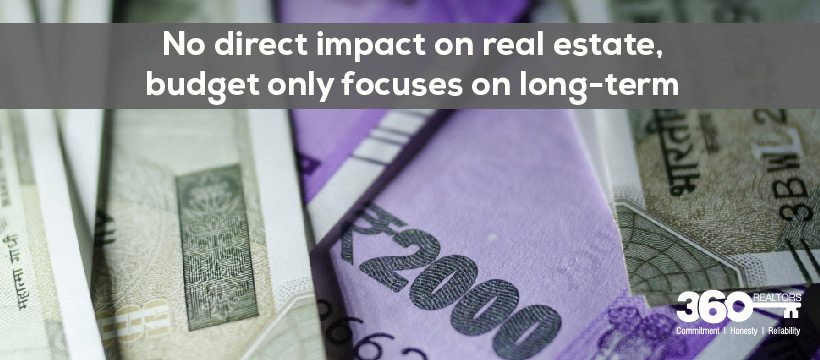With the announcement of the Union Budget 2018, the government is focussing on creating a long-term programme, aiming for inclusive growth. The budget involves the year-round announcements and continues to reform the economy. However, the demands placed by the real estate sector were not directly mentioned in the budget.
During 2016-17, the real estate sector has undergone a lot of reforms. A strong legal framework has been implemented around the sector. Important reforms in the sector include demonetization, RERA, bankruptcy, insolvency and Benami Property (Prevention) Act. These have resulted in a more transparent business environment in the real estate sector. The real estate sector contributes to the economy to a great extent, forming 7.7% of the GVA and in the last five years, it has employed over 25 million people. Evidently, it is one of the most important sectors of the country.
The real estate sector did not receive any direct impact from the announcement of the Union Budget 2018. The real estate industry expected to witness certain relaxation in tax rates under Sec 80C, 80CC and 24B. These could have brought about liquidity in the sector, pushing the demands up. Besides, the budget did not have any mention of the uniform stamp duty reduction or single window clearance, which the developers had expected. The developers had demanded the recognition of the real estate sector as an industry, which too, was not mentioned in the budget.
Nevertheless, the top 5 aspects of the budget that will have an influence on the real estate sector are:
- A dedicated fund has been announced for Affordable Housing. This will bring about a positive momentum in the industry, around the asset-class. The creation of the Affordable Housing Fund under the National Housing Board is likely to strengthen the sector in the long run. This will ensure more access to capital for real estate developments in the urban and semi-urban areas.
- Allocations have been announced for developing roadways, highways over 9000 kms, and infrastructure. Besides, the government has allocated funds for the development of airports in order to increase the capacity by five times. Besides, 600 railway stations are likely to come up in the coming years. These developments will create greater opportunities for real estate developers in these regions.
- The budget has also allocated funds for the development of education and healthcare facilities in the country. This may facilitate senior living to a certain extent.
- The digital infrastructure of the country received a boost, as the government has allocated funds for the sector. However, it has cautioned the people over cryptocurrencies. The allocation of budget for broadband and big data has increased, and the boost to the blockchain technology will further strengthen transparency.
- The corporate tax rate has undergone a reduction from 30% to 25% for companies which have a turnover up to INR 250 crore, and the differences for SEZ occupiers on tax incidence is 21% and the standard tax is just 4%.
All these measures have been taken, focusing on the long-term growth and will have no direct effect on the real estate industry.






